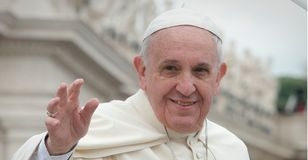
Catholics for Renewal
Subtitle
EDITORIAL April 2023
The Legacy of Pope Francis: 10 years on

From the moment Jorge Bergoglio appeared on the balcony of St Peter’s Basilica following his election as pope on 13 March 2013 and announced his name as Francis, he was embraced with huge enthusiasm and the hope that the reform agenda of Vatican II would at last be implemented.
Vatican II vision and synodality
Some have treated Francis with a hostile ‘frozen violence’. Their resistance derives from Francis’ insistence that, after almost seven decades of obstruction, the vision of Vatican II must be implemented, for its teachings are not a mere pastoral option, but the essential blueprint for authentic church reform and renewal. In 2012 he stated emphatically:
The Council is the Magisterium of the Church. Either you are with the Church and therefore you follow the Council, and if you don't follow the Council, or you interpret it in your own away, as you desire, you do not stand with the Church. The Council must not be negotiated... No: the Council is what it is. [Link ]
The reception of Vatican II has been a long process, with sharp differences over its interpretation and application. Many of its documents expose internal theological and ecclesiological tensions, and on many issues the Church is divided. But Francis insists that resolution can only be achieved through a ‘synodal process’ of deep discernment, inclusive dialogue, and ‘parrhesia’ – courageous, free, and open communication. [LINK]
Closely linked to Francis’ desire
for greater synodality has been the restructuring of the Synod of Bishops and reform of its
processes. The non-ordained and women now have a role, more productive
procedures are being introduced, and there is transparent voting. For Francis ‘synodality’ is essential for the
Church’s understanding of itself and ‘an indispensable precondition
for its mission. Synodality involves ‘the entire People of God’, not just the bishops. [Link]
Many have questioned Francis’ courage on giving women equality in the Church. But he has gone well beyond tokenism, appointing women to key positions of leadership in Vatican dicasteries - even those for Bishops - and establishing a new state of ‘normality’ to facilitate the future progression of women to higher levels of leadership. [Link ]. He has shown some openness to women’s ordination to the permanent diaconate, but none to their ordination to the priesthood.

Clericalism and primacy of conscience
Francis repeatedly condemns clericalism as ‘a
perversion of the Church’. [LINK] and urges all Catholics to repudiate clergy-dependency in
all its forms. Baptism is a call to an adult faith and Catholics must take
moral responsibility for their own choices.
Francis’ “Who am I to judge?” response to a
question on homosexuality was not a tactic to avoid an answer, but an
invitation to the questioner – and everyone - to see others as God sees them,
cares for them and values them:
I am glad that
we are talking about 'homosexual people' because before all else comes the
individual person, in his wholeness and dignity. People should not be defined
only by their sexual tendencies: let us not forget that God loves all his
creatures, and we are destined to receive his infinite love [Link].
Francis constantly reaffirms the primacy of conscience. As priest and bishop Jorge Bergoglio ministered to thousands of impoverished and poorly educated fringe-dwellers whom he called ‘God’s holy faithful People’. Even poorly formed, they managed to navigate their way through intractable moral situations and arrive at peace. These people taught Francis about the compassionate Christ and convinced him that their wisdom of faith was a sure indication that the real presence of Christ was among them. After the Synod on the Family, he wrote:
We also find it hard to make room for the consciences of the faithful, who very often respond as best they can to the Gospel amid their limitations, and are capable of carrying out their own discernment in complex situations. We have been called to form consciences, not to replace them (Amoris Laetitia, n. 37). [LINK]
The ’field hospital’
For Francis the ‘real’ church is a ‘field hospital’
where all who are wounded can receive treatment and the Eucharist ‘is not a
prize for the perfect’ but ‘nourishment for the weak’. [LINK]
For those Catholics who have been most
critical of Pope Francis and those who are in positions of wealth and influence,
this
vision of Church has been extremely unnerving”. [LINK]
Francis has significantly elevated Catholic social teaching on the environment with Laudato si’ (2015) – On the Care for our Common Home - and has challenged the world community to acknowledge and urgently act on the existential threat of climate change and its global impact. The earth is our only home; there is nowhere else to go. [LINK]
In Fratelli Tutti (2021) Francis has called for a much deeper sense of international solidarity and interdependence in tacking the global issues of famine relief, mass migration, the politics of social coercion, torture, the death penalty, and constant warfare. [LINK]
Pope Francis is now in his 87th year. Health wise he is visibly fragile and has already spoken openly of retiring if the office becomes too much of a burden, and of death.
In the ten years he has been the Bishop of Rome and chief Pastor he has brought fresh air into the Church, reinstated the vision of Vatican II, enlivened and confirmed Catholics in their baptismal dignity and sense of faith, and encouraged them to embrace a spirit of hope and confidence for a truly Christ-like Church.
Catholics for Renewal wishes Pope Francis ‘Ad multos annos’ and prays that the synodal path to Church renewal which he has commenced will grow in strength.